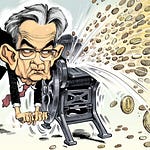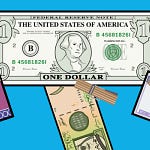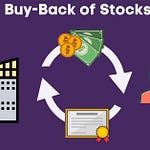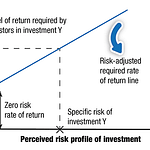Triffin’s Paradox
Before you get distracted by the philosophical-sounding name, Triffin’s paradox, or dilemma as it’s often called, is just a reference to the economic conflict of interest that arises for countries whose currency is used as the global reserve currency.
For anyone unfamiliar with the concept of a global reserve currency, let me add some quick context. For trade or really any transaction between nations to happen, those nations have to either swap each of their respective currencies (like euros for yen) or they need a shared currency they are both willing to hold and exchange. Swapping currencies can be frustrating because nations don’t always want to hold a large amount of another nation’s currency, especially if they don’t trade that much with that country.
This is why nations have opted to price goods in a single currency that pretty much everyone holds. The reason everyone holds it is usually because the issuer is the largest trading nation or an economic superpower that can enforce its currency as the global reserve currency. So most countries just make exchanges with that global reserve currency whenever they trade in the global market.
Now, historically, that common currency everyone held was gold or other precious metals that were widely held and accepted all around the world, but ever since Bretton Woods in 1944, the dollar took its place and became the new global reserve currency everyone held as the plurality of their FX reserves.
What this meant is that all the major globally traded goods like oil, wheat, and other commodities were denominated (fancy word for priced) in dollars and countries would use dollars to trade with other nations. So, if a country like Germany wanted to buy soybeans from Brazil, they would be priced in dollars and both countries would use dollars to settle the trade. But this is where we get to the paradox part of this.
All those dollars every country needs to trade have to come from the US (the global reserve currency issuer). As the issuer of that global reserve currency, it becomes necessary to supply the rest of the world with all the currency units it needs to facilitate trade. So, if a country wants dollars to trade in global markets, it has to run a trade surplus with the US, meaning it has to sell more to the US than the US sells to that country so it can stockpile all those extra dollars it needs. In other words, the US has to run a trade deficit with pretty much every other country to supply them with the dollars they need for global trade.
And this is a big part of why the US has such a massive trade deficit. If it didn’t run a deficit with other countries, there would be a dollar shortage adding serious liquidity constraints on global trade. Without countries having a surplus of dollars from a positive balance of payments with the US, they basically have no money to buy in the global market.
The flip side of that coin, though, is the global reserve currency issuer (the US) is basically forced to keep expanding its deficit unless it wants to contribute to a global liquidity crisis. But a deficit can only expand so much before faith in that currency is lost, so the paradox is the global reserve currency issuer is eventually forced into choosing one of those two undesirable outcomes.
So, just to summarize, Triffin’s paradox refers to the dilemma the global reserve currency issuer faces, which is causing a global liquidity crisis by not supplying enough of its currency to the world or continuously expanding its deficit until all faith in it repaying those debts, and, as a consequence, faith in its currency, is lost.














Share this post